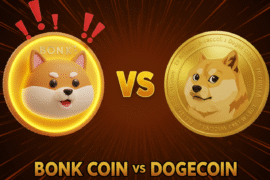This article may contain references to products or services from one or more of our advertisers or partners. We may receive compensation when you click on links to those products or services. Nonetheless, our opinions are our own.
The information presented in this article is accurate to the best of our knowledge at the time of publication. However, information is subject to change, and no guarantees are made about the continued accuracy or completeness of this content after its publication date.
Crypto trading isn’t a one-size-fits-all game — some traders thrive on rapid-fire decisions, while others play the long game. And when it comes to profit-making strategies, scalping and swing trading are the two paths you can travel on. But which one suits you best?
Scalping is all about quick, high-frequency trades, while swing trading focuses on capturing larger price movements over days or weeks. This indicates that each has risks, rewards, and ideal market conditions. Now the question arises: Should you be making split-second moves or waiting for the perfect wave?
Well, whichever path you take, staying informed on key market indicators like Bitcoin trends, Ethereum price movements, and XRP price shifts can make all the difference. So, let’s find out the best approach between Scalping and Swing Trading that fits your trading style.
What is Scalping in Crypto Trading?
As a crypto trader, you must have heard about scalping. Scalping is a high-frequency trading strategy in which traders make multiple small profits within a short time frame, sometimes within minutes or even seconds. Raiders or scalpers rely on minor price movements and aim to execute dozens or even hundreds of daily trades.
Let’s see how Scalping works.
- Traders use technical analysis, price charts, and short-term indicators.
- Positions are held for a few seconds to a few minutes.
- Profits per trade are small, but with high frequency, they add up.
Pros and Cons of Scalping:
| Pros of Scalping | Cons of Scalping |
| Quick profits No need to wait for long-term trends. | Less exposure to market crashes Since trades are short-term, risks from major downturns are lower. |
| Quick profits No need to wait for long-term trends. |
| Pros of Scalping | Cons of Scalping |
| Frequent opportunities The crypto market is volatile, providing multiple chances daily. | High stress Requires constant monitoring of the market. |
| Quick profits No need to wait for long-term trends | Transaction fees Since scalpers execute many trades, fees can reduce profits. |
| Less exposure to market crashes Since trades are short-term, risks from major downturns are lower. | Advanced skill required Not ideal for beginners due to rapid decision-making. |
What is Swing Trading in Crypto?
Swing trading is a medium-term strategy in which traders hold positions for several days or weeks to capitalize on larger price movements. Contrary to Scaling, it focuses on long-term results, relying on trend analysis, news events, and fundamental factors.
So, how does Swing Trading work?
- Traders use a mix of technical and fundamental analysis.
- Positions are held for days, weeks, or even months.
- Aims for larger price swings rather than small daily movements.
| PROS | CONS |
| Less time-intensive It doesn’t require watching charts all day. | Higher market exposure Longer holding periods mean more risk from price crashes. |
| Higher profit per trade Take advantage of major trends. | Patience required Trades take longer to develop. |
| Lower transaction costs Fewer trades mean fewer fees. | Potential overnight risks Sudden news events can impact holdings. |
We discovered that both approaches have their fair share of pros and cons. But which one is more profitable?
Voted "Best Overall Budgeting App" by Forbes and WSJ
Monarch Money helps you budget, track spending, set goals, and plan your financial future—all in one app.
Get 50% OFF your first year with code MONARCHVIP
Scalping vs. Swing Trading
Let’s compare these two strategies on different platforms to see which one is the right approach for you.
1. Profit Potential
Scalping offers quick, consistent profits, but each gain is relatively small.
Swing aims for larger profits per trade, but they are less frequent.
2. Time Commitment
Scalping requires constant attention and quick reactions.
Swing allows for a more relaxed approach, with trades lasting days or weeks.
3. Risk and Market Exposure
Scalpers are less exposed to sudden crashes since they hold positions for a short time.
Swing traders can face overnight risks due to news events affecting crypto prices.
So, Which Strategy is Best for You?
Well, if you prefer fast-paced action and have time to monitor charts, scalping might be a good fit, but if you want to trade part-time without constantly checking the market, swing trading could be more suitable.
Conclusion
Your trading style is like picking the perfect playlist — do you prefer the adrenaline rush of quick beats or the slow build of a classic hit? Scalping is all about speed, precision, and making multiple small gains, while swing trading lets you ride the market waves for bigger wins over time. So, it all depends on you!
Regardless of your chosen strategy, keeping an eye on key market indicators can make all the difference. So, are you a fast-paced trader or a patient strategist?

Reviewed and edited by Albert Fang.
See a typo or want to suggest an edit/revision to the content? Use the contact us form to provide feedback.
At FangWallet, we value editorial integrity and open collaboration in curating quality content for readers to enjoy. Much appreciated for the assist.
Did you like our article and find it insightful? We encourage sharing the article link with family and friends to benefit as well - better yet, sharing on social media. Thank you for the support! 🍉
Article Title: Scalping vs. Swing Trading: Which Crypto Strategy is More Profitable?
https://fangwallet.com/2025/06/04/scalping-vs-swing-trading-which-crypto-strategy-is-more-profitable/The FangWallet Promise
FangWallet is an editorially independent resource - founded on breaking down challenging financial concepts for anyone to understand since 2014. While we adhere to editorial integrity, note that this post may contain references to products from our partners.
The FangWallet promise is always to have your best interest in mind and be transparent and honest about the financial picture.
Become an Insider

Subscribe to get a free daily budget planner printable to help get your money on track!
Make passive money the right way. No spam.
Editorial Disclaimer: The editorial content on this page is not provided by any of the companies mentioned. The opinions expressed here are the author's alone.
The content of this website is for informational purposes only and does not represent investment advice, or an offer or solicitation to buy or sell any security, investment, or product. Investors are encouraged to do their own due diligence, and, if necessary, consult professional advising before making any investment decisions. Investing involves a high degree of risk, and financial losses may occur including the potential loss of principal.
Source Citation References:
+ Inspo
There are no additional citations or references to note for this article at this time.












































